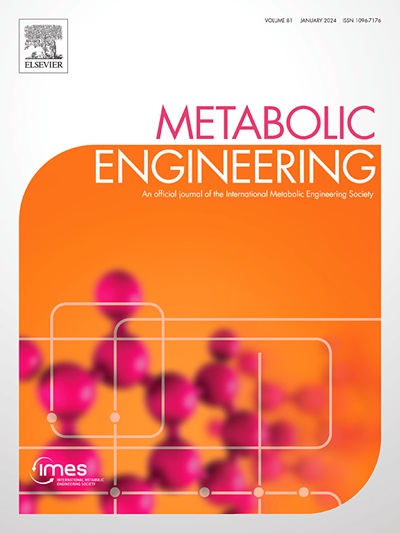Optimized genome-wide CRISPR screening enables rapid engineering of growth-based phenotypes in Yarrowia lipolytica
IF 6.8
1区 生物学
Q1 BIOTECHNOLOGY & APPLIED MICROBIOLOGY
引用次数: 0
Abstract
CRISPR-Cas9 functional genomic screens uncover gene targets linked to various phenotypes for metabolic engineering with remarkable efficiency. However, these genome-wide screens face a number of design challenges, including variable guide RNA activity, ensuring sufficient genome coverage, and maintaining high transformation efficiencies to ensure full library representation. These challenges are prevalent in non-conventional yeast, many of which exhibit traits that are well suited to metabolic engineering and bioprocessing. To address these hurdles in the oleaginous yeast Yarrowia lipolytica, we designed a compact, high-activity genome-wide sgRNA library. The library was designed using DeepGuide, a sgRNA activity prediction algorithm and a large dataset of ∼50,000 sgRNAs with known activity. Three guides per gene enables redundant targeting of 98.8% of genes in the genome in a library of 23,900 sgRNAs. We deployed the optimized library to uncover genes essential to the tolerance of acetate, a promising alternative carbon source, and various hydrocarbons present in many waste streams. Our screens yielded several gene knockouts that improve acetate tolerance on their own and as double knockouts in media containing acetate as the sole carbon source. Analysis of the hydrocarbon screens revealed genes related to fatty acid and alkane metabolism in Y. lipolytica. The optimized CRISPR gRNA library and its successful use in Y. lipolytica led to the discovery of alternative carbon source-related genes and provides a workflow for creating high-activity, compact genome-wide libraries for strain engineering.
经过优化的全基因组 CRISPR 筛选可实现基于脂肪溶解性亚罗菌生长表型的快速工程化。
CRISPR-Cas9 功能基因组筛选能高效地发现与代谢工程各种表型相关的基因靶标。然而,这些全基因组筛选面临着一系列设计挑战,包括可变的引导 RNA 活性、确保足够的基因组覆盖率以及保持高转化效率以确保文库的全面代表性。这些挑战在非常规酵母中普遍存在,其中许多酵母的性状非常适合代谢工程和生物加工。为了解决油脂酵母 Yarrowia lipolytica 的这些难题,我们设计了一个紧凑、高活性的全基因组 sgRNA 文库。该文库是利用 DeepGuide(一种 sgRNA 活性预测算法)和一个包含 50,000 个已知活性 sgRNA 的大型数据集设计的。在由 23,900 条 sgRNA 组成的文库中,每个基因有三条引导线,可对基因组中 98.8% 的基因进行冗余靶向。我们利用优化后的文库发现了耐受醋酸盐(一种很有前途的替代碳源)和许多废物流中的各种碳氢化合物所必需的基因。我们的筛选结果表明,在含有醋酸盐作为唯一碳源的培养基中,有几种基因敲除可以提高对醋酸盐的耐受性。对碳氢化合物筛选的分析发现了与脂溶性酵母中脂肪酸和烷烃代谢有关的基因。优化的 CRISPR gRNA 文库及其在溶脂芽孢杆菌中的成功应用发现了替代碳源相关基因,并为菌株工程学提供了一个创建高活性、紧凑型全基因组文库的工作流程。
本文章由计算机程序翻译,如有差异,请以英文原文为准。
求助全文
约1分钟内获得全文
求助全文
来源期刊

Metabolic engineering
工程技术-生物工程与应用微生物
CiteScore
15.60
自引率
6.00%
发文量
140
审稿时长
44 days
期刊介绍:
Metabolic Engineering (MBE) is a journal that focuses on publishing original research papers on the directed modulation of metabolic pathways for metabolite overproduction or the enhancement of cellular properties. It welcomes papers that describe the engineering of native pathways and the synthesis of heterologous pathways to convert microorganisms into microbial cell factories. The journal covers experimental, computational, and modeling approaches for understanding metabolic pathways and manipulating them through genetic, media, or environmental means. Effective exploration of metabolic pathways necessitates the use of molecular biology and biochemistry methods, as well as engineering techniques for modeling and data analysis. MBE serves as a platform for interdisciplinary research in fields such as biochemistry, molecular biology, applied microbiology, cellular physiology, cellular nutrition in health and disease, and biochemical engineering. The journal publishes various types of papers, including original research papers and review papers. It is indexed and abstracted in databases such as Scopus, Embase, EMBiology, Current Contents - Life Sciences and Clinical Medicine, Science Citation Index, PubMed/Medline, CAS and Biotechnology Citation Index.
 求助内容:
求助内容: 应助结果提醒方式:
应助结果提醒方式:


